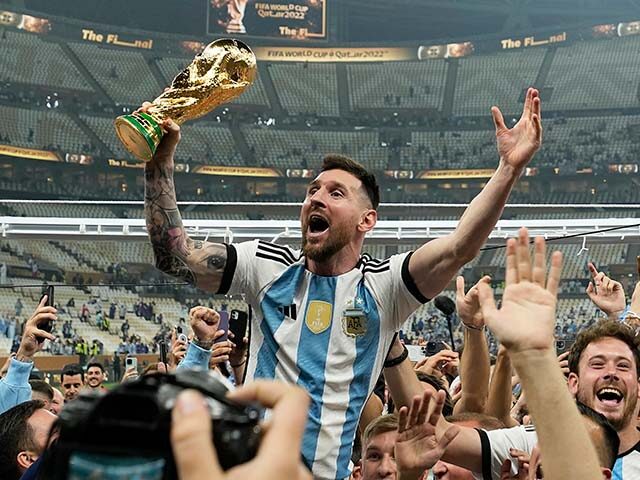Local soccer authorities in Beijing and Hangzhou, China, announced this weekend that they would no longer host friendly games scheduled for March featuring Argentina’s national team, apparently part of the ongoing backlash in China against Argentine star Lionel Messi for being injured during a game in Hong Kong.
Messi, arguably the most popular athlete on the planet and a welcome face in communist China as recently as this past summer, has prompted an international uproar after failing to play during an exhibition match in Hong Kong on February 4, angering fans who had paid hundreds of dollars for the opportunity to watch the soccer great. The Chinese government became involved when Messi continued touring Asia later that week with his team, Inter Miami, and played a match in Tokyo, Japan. Chinese regime-controlled media accused Messi of attempting to make a “political” statement by playing in Japan and accused him of appearing less dour and more jovial in Japan than in Chinese-controlled Hong Kong.
Hong Kong has experienced years of turmoil that began with an attempt by Beijing to violate the “One Country, Two Systems” policy and demand the extradition of people from Hong Kong whom the Communist Party deemed criminals. The move triggered a year-long protest movement attracting millions of dissents – and a subsequent violent crackdown and the de facto end of “One Country, Two Systems.” Hong Kong has struggled to regain the trust of spooked foreign investors since then, who previously flocked to the city as a capitalist oasis exempt from onerous communist regulation.
Messi, the captain of the Argentine national soccer team, has never made any public declarations against Chinese communism, however, or supported the Hong Kong protests. He gave no indication that he was attempting a “political” statement during remarks last week explaining his injury and calling his absence in the Hong Kong match a “shame.”
Predictions in Chinese state media that Messi could lose financial opportunities in communist China appeared to begin to come true this weekend when the Beijing Football Association announced in a curt statement that it had no plans to host any matches including Lionel Messi. The equivalent authority in Hangzhou, the regional capital of Zhejiang province, more directly stated that the Argentines were no longer welcome there due to “well-known reasons,” presumably the Hong Kong fiasco.
The Argentine team was scheduled to play in the two Chinese cities in March. In Beijing, Argentina would have played against Ivory Coast; the Hangzhou match was expected to take place against the Nigerian national team. Some reports have suggested FIFA, the international soccer body, is considering relocating the matches to America, though that would require coordination with all three teams and no party to the matter has yet to issue any official statements.
“In view of the well-known reasons, it is understood from the competent authorities that the conditions for holding the event are not met, and the decision has been made to cancel the event,” the Hangzhou federation said, without elaborating or mentioning Messi. It claims conditions were not “mature” for hosting the game.
The Beijing statement mentioned Messi but claimed that the federation had no planned matches in which he would participate, essentially giving the impression no one had expected the Argentine team in China in March at all.
The Global Times gloated on Saturday that, as a result of the situation in Hong Kong, “Messi, is not likely to be welcomed in the Chinese market in the short-term.”
“Industry observers warned that Messi’s recent actions could lead to a decline in its commercial value in the Chinese market,” the Times added. “Messi is one of the world’s most expensive soccer players, coming in at second place in Forbes 2023 List of the World’s Highest Paid Athletes.”
Messi is no stranger to Chinese regime-approved money. The star has collaborated, the Global Times recalled, with Chinese brands such as JT Express and alcoholic beverage purveyor Chishuihe. In 2023, Messi appeared on a livestream by the Chinese Alibaba e-commerce giant subsidiary Taobao, attempting to speak Mandarin.
Messi played a match in June in China on dictator Xi Jinping’s birthday.
Messi has made multiple attempts in the past week to subdue the anger against him in China. Writing in Chinese and Spanish in a post on his profile on Weibo, a Chinese regime-controlled social media platform, Messi wished fans a “happy year of the dragon!” and said it was “truly a shame not to play in Hong Kong.”
“Those who know me know that I always want to play, that is what I always want to do in any match, and especially in these matches that we travel so far and people are so excited to see our matches,” he wrote.
Weibo users condemned Messi for beginning his post with, “Hi to all my fans in China and Hong Kong!” claiming that referring to Hong Kong as separate from China was an anti-communist political statement.
“Why would a foreigner want to divide our country?” one angry regime-approved commenter responded.
In more extended comments during a press conference last week, Messi explained his injury.
In the first match on the tour in [Saudi] Arabia I felt discomfort in my adductor [leg muscle], that’s why I exited,” Messi said. “In the second match, I played the minutes I played to test myself … Then we went to Hong Kong and had the open-door training and I went out because of the number of people we had and because there was also a clinic with the kids to do and I wanted to be present and participate.”
In any match, someone can be injured. it happened to me,” Messi continued. “I couldn’t be in the Hong Kong match and it was a shame.”
Messi notably has not apologized for the situation, infuriating Chinese state media.
Follow Frances Martel on Facebook and Twitter.

COMMENTS
Please let us know if you're having issues with commenting.